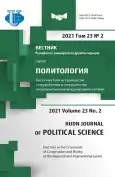Дипломатия знаний как инструмент внешней политики Республики Корея: теоретические аспекты и практическое применение на примере KOICA Scholarship Program
- Авторы: Варпаховскис Э.1
-
Учреждения:
- Национальный исследовательский университет «Высшая школа экономики»
- Выпуск: Том 23, № 2 (2021): Восточная Азия на перекрестке сотрудничества и соперничества на региональном и международном уровнях
- Страницы: 265-278
- Раздел: МЯГКАЯ СИЛА И ПУБЛИЧНАЯ ДИПЛОМАТИЯ В ВОСТОЧНОЙ АЗИИ
- URL: https://journal-vniispk.ru/2313-1438/article/view/322122
- DOI: https://doi.org/10.22363/2313-1438-2021-23-2-265-278
- ID: 322122
Цитировать
Аннотация
Актуальность данного исследования обусловлена ограниченным пониманием механизмов публичной дипломатии, которые активизируются при проведении стипендиальных программ для иностранных студентов странами Восточной Азии, в частности Южной Кореей. Более того, актуальность темы также определена малой исследованностью роли знаний в механизмах публичной дипломатии. Автор данной статьи рассматривает южнокорейскую стипендиальную программу по обмену иностранными студентами - KOICA Scholarship Program. В данном кейсе анализируется содержание официальных документов, утвержденных Правительством Республики Корея (РК), документов и материалов, публикуемых подчиненными Правительству Кореи организациями, проводящими стипендиальные программы для иностранных студентов, а также научные работы по теме дипломатии знаний и смежным темам. Элементом новизны является то, что для анализа применяется набирающая популярность в мире концепция - дипломатия знаний, которая в русскоязычной научной сфере практически не использовалась. Также рассматриваются прежде малоисследованные образовательные инструменты публичной дипломатии как корейские стипендиальные программы. Анализ официальных документов РК показал, что концепция знаний в официальной корейской интерпретации отличается от существующих интерпретаций на Западе (Великобритания, США). Анализ стипендиальной программы показал, что она выполняет не все цели, возлагающиеся Правительством на дипломатию знаний. В частности, Корея успешно транслирует знания о корейской истории и культуре, а также профессиональные знания, в то время как сфера обмена знаниями в рамках данной программы остается неосвоенной. В конце статьи автор приводит ряд практических рекомендаций по улучшению эффективности стипендиальной программы как инструмента дипломатии знаний.
Об авторах
Эрикс Варпаховскис
Национальный исследовательский университет «Высшая школа экономики»
Автор, ответственный за переписку.
Email: evarpahovskis@hse.ru
ORCID iD: 0000-0002-6740-6377
доктор политических наук Университета иностранных языков Ханкук (Южная Корея), научный сотрудник кафедры зарубежного регионоведения факультета мировой экономики и мировой политики
Москва, Российская ФедерацияСписок литературы
- Antyukhova, E.A. (2018). Education as a Soft Power in Modern Foreign and Russian Politological Research. Vestnik Volgogradskogo gosudarstvennogo universiteta. Istoriya. Regionovedenie. Mezhdunarodnye otnosheniya, 23(4), 197–209. DOI: 10.15688/ jvolsu4.2018.4.17. (In Russian)
- Mchedlova, M.M. (Ed.) (2020). Educational migration in contemporary world: Subjects, strategies, values. Moscow: RUDN. (In Russian)
- Asada, S.R. (2019). Study abroad and knowledge diplomacy: increasing awareness and connectivity to the host country, host region, and world. Compare: A Journal of Comparative and International Education, 1-16
- Ayhan, K.J. (2019). Rethinking Korea’s Middle Power Diplomacy as a Nation Branding Project. Korea Observer, 50(1), 1-24
- Ayhan, K.J., & Gouda, M. (2021). Determinants of Global Korea Scholarship students’ Word-of-Mouth about Korea. Asia Pacific Education Review, 1-15. doi: 10.1007/s12564020-09648-8
- Banks, R. (2011). A Resource Guide to Public Diplomacy Evaluation. CPD Perspectives on Public Diplomacy. USC
- Bettie, M. (2019). Exchange diplomacy: theory, policy and practice in the Fulbright program. Place Branding and Public Diplomacy, 1-12
- Byun, K., & Kim, M. (2011). Shifting patterns of the government’s policies for the internationalization of Korean higher education. Journal of Studies in International Education, 15(5), 467-486
- Fominykh, A. (2020). Russian Public Diplomacy Through Higher Education. In Russia’s Public Diplomacy (pp. 119-132). Palgrave Macmillan, Cham
- Kazarinova, D., & Taisheva, V. (2019). Perceptions of Russia in the Global World. Russia in Global Affairs, 17(4), 20-52. doi: 10.31278/1810-6374-2019-17-4-20-52
- Kim, T. (2012). Paradigm Shift in Diplomacy: A Conceptual Model for Korea’s “New Public Diplomacy”. Korea Observer, 43(4), 527-555.
- Kim, T. (2015). Knowledge Diplomacy and Think Tanks’ Role. Sungkyun China Brief, 3(3), 92-100.
- Knight, J. (2019). Knowledge Diplomacy in Action. British Council Discussion Paper.
- Leonard, M., Stead, C., & Smewing, C. (2002). Public diplomacy. Foreign Policy Centre, 2002.
- McConachie, B. (2019). Australia’s use of international education as public diplomacy in China: foreign policy or domestic agenda? Australian Journal of International Affairs, 73(2), 198-211.
- MOFA (2019). Diplomatic White Paper 2019. Ministry of Foreign of Affairs of the Republic of Korea.
- Ogunnubi, O., & Shawa, L.B. (2017). Analysing South Africa’s Soft Power in Africa Through the Knowledge Diplomacy of Higher Education. Journal of Higher Education in Africa/Revue de l’enseignement supérieur en Afrique, 15(2), 81-108
- Park, H. (2020). New Public Diplomacy as a Middle Power Diplomacy: The South Korean Case. International Interdisciplinary Conference “Korea and Russia: International Agenda”. October 19-20, 2020. Retrieved 1 December 2020 from https://youtu.be/R1cn8lJTbdo
- Ryan, M.P. (1998). Knowledge diplomacy: Global competition and the politics of intellectual property. Brookings Institution Press
- Snow, N. (2008). International exchanges and the US image. The Annals of the American Academy of Political and Social Science, 616(1), 198-222
- Varpahovskis, E. (2019). Construction and Influence of South Korea’s Country Image on Relationship Maintenance Behavior of KGSP alumni (Ph.D. dissertation). Hankuk University of Foreign Studies
- Varpahovskis, E. (2020a). Generating Soft Power Through Education: How South Korea approaches Central Asia with its Education Diplomacy. In: M.E. Erendor & M.F. Öztarsu. (Eds.), Contemporary Issues of International Relations: The Problems of International Community (pp. 377-415). Cambridge Scholars Publishing. 2020a
- Varpahovskis, E. (2020b) Network-Building between Global Korea Scholarship (GKS) Recipients and Koreans: Obstacles and Potential. International Interdisciplinary Conference “Korea and Russia: International Agenda”. October 19-20, 2020. Retrieved December 01, 2020, from https://youtu.be/R1cn8lJTbdo
- Varpahovskis, E., & Ayhan, K.J. (2020). Impact of country image on relationship maintenance: a case study of Korean Government Scholarship Program alumni. Place Branding and Public Diplomacy, 1-13. doi: 10.1057/s41254-020-00177-0
- Wilson, I. (2014). International education programs and political influence: Manufacturing sympathy? Springer
Дополнительные файлы









